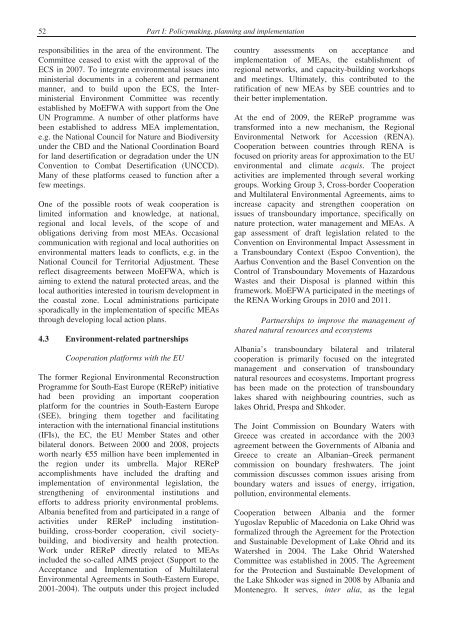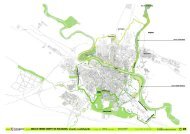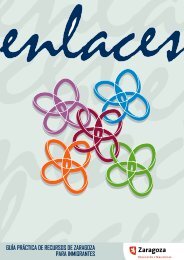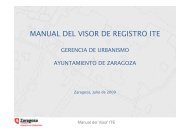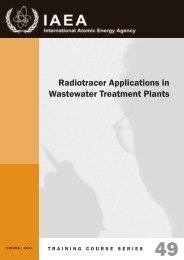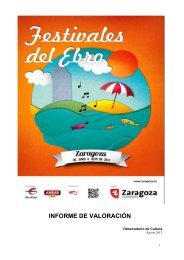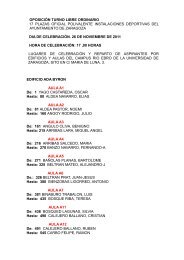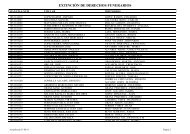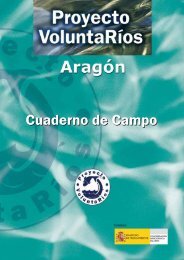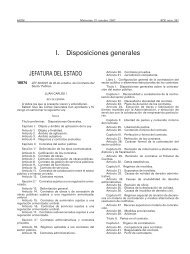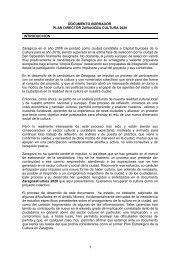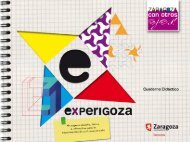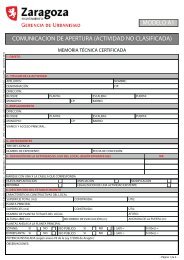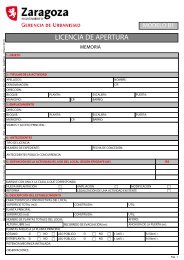Chapter 4: Implementation <strong>of</strong> international agreements and commitments51national legislation transposing MEAs. The focus <strong>of</strong>this process is to clarify financial implications for theGovernment. Besides a fiscal impact assessment,explanatory statements that accompany draft laws aresupposed to contain an assessment <strong>of</strong> social andeconomic impacts related to its implementation, aswell as an analysis <strong>of</strong> priorities and potentialproblems in implementing the draft law, andimplementation capacity issues. In consequence,although regulatory impact analysis (RIA) has not yetbeen <strong>of</strong>ficially introduced into the <strong>Albania</strong>nlegislative system, some elements <strong>of</strong> such analysisshould be carried out in conjunction with explanatorystatements preparation. There is no evidence,however, that such statements were developed forMEAs ratified by <strong>Albania</strong>. A World Bank-financedproject is currently assisting the Government inrealizing the 2007 Action Plan on RegulatoryReform, including the systematic use <strong>of</strong> RIA.Institutional frameworkMoEFWA has remained the principal authorityresponsible for the implementation <strong>of</strong> <strong>Albania</strong>’senvironmental commitments. The Directorate <strong>of</strong>Integration and Projects within MoEFWA has theoverall responsibility for international cooperation.MoEFWA experts responsible for relevantenvironmental areas, e.g. biodiversity, chemicals andclimate change, are the focal points for internationalagreements. Several focal points stay, however, withthe public health, agriculture and maritime transportauthorities.MoEFWA has undergone several reorganizations andits staff dealing with environmental issues has almostdoubled. However, given the widened scope <strong>of</strong>environmental authorities’ activities, it remainsquestionable whether real capacity for managing thecountry’s international obligations on environmenthas increased.In terms <strong>of</strong> international environmental cooperation,MoEFWA shares responsibility with MoFA, whichhas the authority to initiate the ratification <strong>of</strong> MEAs,as well as the Ministry <strong>of</strong> European Integration,which is responsible for coordinating and monitoringmeasures for the implementation <strong>of</strong> the requirements<strong>of</strong> the SAA and the Instrument for Pre-AccessionAssistance (IPA). All ministries have Europeanintegration units and IPA coordinators.Donor coordination is <strong>of</strong> great importance in thepreparation <strong>of</strong> programme assistance. TheGovernment is involved in the process <strong>of</strong> donorcoordination through the Integrated Planning System(IPS), a mechanism aiming to reform the way publicfunds (both domestic and foreign) are managed. TheIPS was approved by the Government in 2005 anddeploys a strategic framework, ensuring that<strong>Albania</strong>n core policy and financial processes functionin a coherent, efficient and integrated manner.The Government established DSDC in 2005. It hasthe tw<strong>of</strong>old objective <strong>of</strong> ensuring that theGovernment’s strategic planning and budgetingprocesses are coherent and effectively managed, andthat external assistance is targeted towards nationalpriorities. By coordinating foreign aid to <strong>Albania</strong>,DSDC provides a one-stop-shop for donors withrespect to strategic matters related to externalassistance. As such, it is responsible for organizingmajor coordination activities such as theGovernment–donor roundtables and the IPS SupportGroup. DSDC participates in negotiations lead by theMinistry <strong>of</strong> European Integration on IPAprogramming. In cooperation with donors and lineministries, DSDC has established 10 sector workinggroups, including the Sector Working Group onEnvironment. The purpose <strong>of</strong> their work is to ensurethat external assistance is effectively coordinated andsupports sector strategy aims. In addition, donormeetings are regularly convened to coordinate futureplans. DSDC has established strong communicationand cooperation channels with European integrationunits that operate in all ministries, contributing in thisway to the improvement <strong>of</strong> intra-Governmentcoherence.In order to improve the system <strong>of</strong> donor-financedproject monitoring, DSDC, in cooperation with theDonor Technical Secretariat, established andmaintains a database with general data on eachproject, including the donors and beneficiaries,amounts committed and disbursed, correlation withGovernment’s strategic areas, thematic andgeographic scope, and implementation periods. Thefocus is on ongoing projects, though information oncompleted projects is also available, dating back to1994. No information on project outputs oroutcomes, or even project web pages, is available s<strong>of</strong>ar. Most <strong>of</strong> the information from the database isdisclosed to the general public through the DSCD’swebsite. While <strong>of</strong>fering the possibility <strong>of</strong> a globalpicture <strong>of</strong> various projects, this database does not yetenable users to understand the actual impact <strong>of</strong> donoraid on development.In the environmental sector, several coordinationplatforms have been active since the first EPR. In theperiod between 2003 and 2007, the Cross-sectorCommittee for NEAP (National <strong>Environmental</strong>Action Plan) Implementation coordinated theactivities <strong>of</strong> different ministries and institutions with
52 Part I: Policymaking, planning and implementationresponsibilities in the area <strong>of</strong> the environment. TheCommittee ceased to exist with the approval <strong>of</strong> theECS in 2007. To integrate environmental issues intoministerial documents in a coherent and permanentmanner, and to build upon the ECS, the InterministerialEnvironment Committee was recentlyestablished by MoEFWA with support from the OneUN Programme. A number <strong>of</strong> other platforms havebeen established to address MEA implementation,e.g. the National Council for Nature and Biodiversityunder the CBD and the National Coordination Boardfor land desertification or degradation under the UNConvention to Combat Desertification (UNCCD).Many <strong>of</strong> these platforms ceased to function after afew meetings.One <strong>of</strong> the possible roots <strong>of</strong> weak cooperation islimited information and knowledge, at national,regional and local levels, <strong>of</strong> the scope <strong>of</strong> andobligations deriving from most MEAs. Occasionalcommunication with regional and local authorities onenvironmental matters leads to conflicts, e.g. in theNational Council for Territorial Adjustment. Thesereflect disagreements between MoEFWA, which isaiming to extend the natural protected areas, and thelocal authorities interested in tourism development inthe coastal zone. Local administrations participatesporadically in the implementation <strong>of</strong> specific MEAsthrough developing local action plans.4.3 Environment-related partnershipsCooperation platforms with the EUThe former Regional <strong>Environmental</strong> ReconstructionProgramme for South-East Europe (REReP) initiativehad been providing an important cooperationplatform for the countries in South-Eastern Europe(SEE), bringing them together and facilitatinginteraction with the international financial institutions(IFIs), the EC, the EU Member States and otherbilateral donors. Between 2000 and 2008, projectsworth nearly €55 million have been implemented inthe region under its umbrella. Major RERePaccomplishments have included the drafting andimplementation <strong>of</strong> environmental legislation, thestrengthening <strong>of</strong> environmental institutions andefforts to address priority environmental problems.<strong>Albania</strong> benefited from and participated in a range <strong>of</strong>activities under REReP including institutionbuilding,cross-border cooperation, civil societybuilding,and biodiversity and health protection.Work under REReP directly related to MEAsincluded the so-called AIMS project (Support to theAcceptance and Implementation <strong>of</strong> Multilateral<strong>Environmental</strong> Agreements in South-Eastern Europe,2001-2004). The outputs under this project includedcountry assessments on acceptance andimplementation <strong>of</strong> MEAs, the establishment <strong>of</strong>regional networks, and capacity-building workshopsand meetings. Ultimately, this contributed to theratification <strong>of</strong> new MEAs by SEE countries and totheir better implementation.At the end <strong>of</strong> 2009, the REReP programme wastransformed into a new mechanism, the Regional<strong>Environmental</strong> Network for Accession (RENA).Cooperation between countries through RENA isfocused on priority areas for approximation to the EUenvironmental and climate acquis. The projectactivities are implemented through several workinggroups. Working Group 3, Cross-border Cooperationand Multilateral <strong>Environmental</strong> Agreements, aims toincrease capacity and strengthen cooperation onissues <strong>of</strong> transboundary importance, specifically onnature protection, water management and MEAs. Agap assessment <strong>of</strong> draft legislation related to theConvention on <strong>Environmental</strong> Impact Assessment ina Transboundary Context (Espoo Convention), theAarhus Convention and the Basel Convention on theControl <strong>of</strong> Transboundary Movements <strong>of</strong> HazardousWastes and their Disposal is planned within thisframework. MoEFWA participated in the meetings <strong>of</strong>the RENA Working Groups in 2010 and 2011.Partnerships to improve the management <strong>of</strong>shared natural resources and ecosystems<strong>Albania</strong>’s transboundary bilateral and trilateralcooperation is primarily focused on the integratedmanagement and conservation <strong>of</strong> transboundarynatural resources and ecosystems. Important progresshas been made on the protection <strong>of</strong> transboundarylakes shared with neighbouring countries, such aslakes Ohrid, Prespa and Shkoder.The Joint Commission on Boundary Waters withGreece was created in accordance with the 2003agreement between the Governments <strong>of</strong> <strong>Albania</strong> andGreece to create an <strong>Albania</strong>n–Greek permanentcommission on boundary freshwaters. The jointcommission discusses common issues arising fromboundary waters and issues <strong>of</strong> energy, irrigation,pollution, environmental elements.Cooperation between <strong>Albania</strong> and the formerYugoslav Republic <strong>of</strong> Macedonia on Lake Ohrid wasformalized through the Agreement for the Protectionand Sustainable Development <strong>of</strong> Lake Ohrid and itsWatershed in 2004. The Lake Ohrid WatershedCommittee was established in 2005. The Agreementfor the Protection and Sustainable Development <strong>of</strong>the Lake Shkoder was signed in 2008 by <strong>Albania</strong> andMontenegro. It serves, inter alia, as the legal
- Page 1 and 2:
UNITED NATIONS ECONOMIC COMMISSION
- Page 6 and 7:
vPrefaceThe second EPR of Albania b
- Page 8 and 9:
viiLIST OF TEAM MEMBERSMr. Antoine
- Page 10 and 11:
ixMinistry of Agriculture, Food and
- Page 12 and 13:
xiCONTENTSForeword ................
- Page 14 and 15:
8.3 Biological diversity ..........
- Page 16 and 17:
xvPageChapter 8Table 8.1:Table 8.2:
- Page 18 and 19:
xviiPageLIST OF PHOTOSIntroductionP
- Page 20 and 21:
xixLIST OF ABBREVIATIONSAICASCICANP
- Page 22 and 23:
xxiSIGNS AND MEASURES .. not availa
- Page 24 and 25:
xxiiiExecutive summaryThe first Env
- Page 26 and 27:
The entire education system is subj
- Page 28 and 29:
was done by international consultan
- Page 30 and 31: 1Introduction I.1 Physical contextA
- Page 32 and 33: Introduction3The country has deposi
- Page 34 and 35: Introduction5Photo I.1: Ruins of Sk
- Page 36: PART I: POLICYMAKING, PLANNING AND
- Page 39 and 40: 10 Part I: Policymaking, planning a
- Page 41 and 42: 12 Part I: Policymaking, planning a
- Page 43 and 44: 14 Part I: Policymaking, planning a
- Page 45 and 46: 16 Part I: Policymaking, planning a
- Page 47 and 48: 18 Part I: Policymaking, planning a
- Page 49 and 50: 20 Part I: Policymaking, planning a
- Page 51 and 52: 22 Part I: Policymaking, planning a
- Page 53 and 54: 24 Part I: Policymaking, planning a
- Page 55 and 56: 26 Part I: Policymaking, planning a
- Page 57 and 58: 28 Part I: Policymaking, planning a
- Page 59 and 60: 30 Part I: Policymaking, planning a
- Page 61 and 62: 32 Part I: Policymaking, planning a
- Page 63 and 64: 34 Part I: Policymaking, planning a
- Page 65 and 66: 36 Part I: Policymaking, planning a
- Page 67 and 68: 38 Part I: Policymaking, planning a
- Page 69 and 70: 40 Part I: Policymaking, planning a
- Page 71 and 72: 42 Part I: Policymaking, planning a
- Page 73 and 74: 44 Part I: Policymaking, planning a
- Page 75 and 76: 46 Part I: Policymaking, planning a
- Page 77 and 78: 48 Part I: Policymaking, planning a
- Page 79: 50 Part I: Policymaking, planning a
- Page 83 and 84: 54 Part I: Policymaking, planning a
- Page 85 and 86: 56 Part I: Policymaking, planning a
- Page 87 and 88: 58 Part I: Policymaking, planning a
- Page 89 and 90: 60 Part I: Policymaking, planning a
- Page 91 and 92: 62 Part I: Policymaking, planning a
- Page 93 and 94: 64 Part I: Policymaking, planning a
- Page 96 and 97: 67Chapter 5ECONOMIC INSTRUMENTS AND
- Page 98 and 99: Chapter 5: Economic instruments and
- Page 100 and 101: Chapter 5: Economic instruments and
- Page 102 and 103: Chapter 5: Economic instruments and
- Page 104 and 105: Chapter 5: Economic instruments and
- Page 106 and 107: Chapter 5: Economic instruments and
- Page 108: PART III: INTEGRATION OF ENVIRONMEN
- Page 111 and 112: 82 Part III: Integration of environ
- Page 113 and 114: 84 Part III: Integration of environ
- Page 115 and 116: 86 Part III: Integration of environ
- Page 117 and 118: 88 Part III: Integration of environ
- Page 119 and 120: 90 Part III: Integration of environ
- Page 121 and 122: 92 Part III: Integration of environ
- Page 124 and 125: 95Chapter 7WASTE MANAGEMENT7.1 Intr
- Page 126 and 127: Chapter 7: Waste management97sold f
- Page 128 and 129: Chapter 7: Waste management99SitesC
- Page 130 and 131:
Chapter 7: Waste management101Table
- Page 132 and 133:
Chapter 7: Waste management103• C
- Page 134 and 135:
Chapter 7: Waste management105sever
- Page 136:
Chapter 7: Waste management107(b) E
- Page 139 and 140:
110 Part III: Integration of enviro
- Page 141 and 142:
112 Part III: Integration of enviro
- Page 143 and 144:
114 Part III: Integration of enviro
- Page 145 and 146:
116 Part III: Integration of enviro
- Page 147 and 148:
118 Part III: Integration of enviro
- Page 149 and 150:
120 Part III: Integration of enviro
- Page 151 and 152:
122 Part III: Integration of enviro
- Page 153 and 154:
124 Part III: Integration of enviro
- Page 155 and 156:
126 Part III: Integration of enviro
- Page 157 and 158:
128 Part III: Integration of enviro
- Page 159 and 160:
130 Part III: Integration of enviro
- Page 161 and 162:
132 Part III: Integration of enviro
- Page 164 and 165:
135Chapter 10HUMAN HEALTH AND ENVIR
- Page 166 and 167:
Chapter 10: Human health and enviro
- Page 168 and 169:
Chapter 10: Human health and enviro
- Page 170 and 171:
Chapter 10: Human health and enviro
- Page 172 and 173:
Chapter 10: Human health and enviro
- Page 174 and 175:
Chapter 10: Human health and enviro
- Page 176 and 177:
Chapter 10: Human health and enviro
- Page 178:
Chapter 10: Human health and enviro
- Page 182 and 183:
153Annex IIMPLEMENTATION OF THE REC
- Page 184 and 185:
The new 2011 Law on Environmental P
- Page 186 and 187:
Recommendation 3.2:Albania needs to
- Page 188 and 189:
Recommendation 4.2:The Ministry of
- Page 190 and 191:
for 2004 was prepared within the St
- Page 192 and 193:
163Chapter 6: WATER MANAGEMENTRecom
- Page 194 and 195:
There is no updated water resources
- Page 196 and 197:
international consulting and author
- Page 198 and 199:
it is limited only to the level of
- Page 200 and 201:
taken. In addition, NES2, under MoE
- Page 202 and 203:
173Chapter 12: HUMAN HEALTH AND THE
- Page 204:
Recommendation 12.5:(a) The Ministr
- Page 207 and 208:
178Worldwide agreementsYear1979 (BO
- Page 210 and 211:
181Annex IIISELECTED ECONOMIC AND E
- Page 212 and 213:
183Land resources and soil 2002 200
- Page 214:
Education 2002 2003 2004 2005 2006
- Page 217 and 218:
188Law on Local Tax System, No. 963
- Page 220 and 221:
191SourcesIndividual authors1. Bego
- Page 222 and 223:
19336. Albania, Ministry of Environ
- Page 224 and 225:
19568. National Agency of Natural R
- Page 226 and 227:
197101. International POPs Eliminat
- Page 228 and 229:
199UNDP and Ministry of Environment
- Page 230:
201172. National Agency for Environ


